 Society
Society

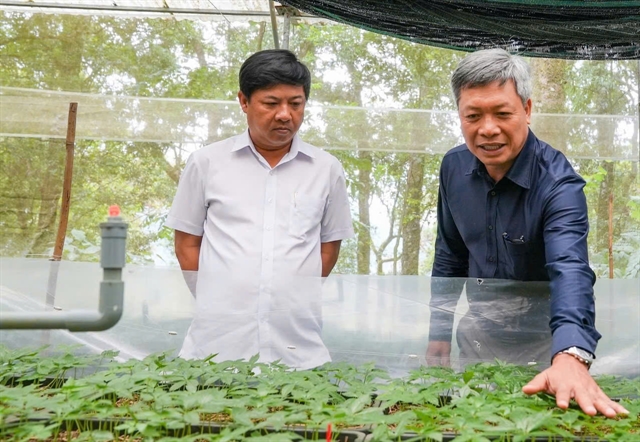 |
| Vice Chairman of Đà Nẵng City People's Committee Hồ Quang Bửu (right) is introduced to a Ngọc Linh Ginseng farm in a rural mountainous commune. — Photo courtesy of Phan Vinh |
Công Thành
ĐÀ NẴNG — The Government’s recently issued Decree 183 is expected to remove a barrier on the future development of the Ngọc Linh ginseng, also known as Vietnamese ginseng, and to develop the city of Đà Nẵng into a key regional centre for producing the valuable herb.
Vice Chairman of the municipal People’s Committee Hồ Quang Bửu listed the various benefits of the decree, which is seen as a decisive legal framework ensuring sustainable growth for the ginseng farming and processing industry.
Bửu said the new regulations will create favourable conditions in terms of a legal basis for environmental and primary forest protection, benefitting local farmers and investors growing and processing ginseng products.
He said the decree will allow the use of some of the special-use forest on Ngọc Linh Mountain in the Nam Trà My area of the former Quảng Nam Province, which is now merged into Đà Nẵng City.
“Under the forest canopy, ginseng farming will nurture the industry in a well-controlled and qualified way, so that farmers can produce the famous herb on terrain from 1,500m to 2,000m above sea level,” Bửu said.
“This will help Đà Nẵng achieve a target of expanding its ginseng growing area to 20,000ha by 2030 and improving living standards and incomes for local ethnic groups in the region, while working to reach the World Health Organisation's Good Agricultural and Collection Practices standard with Ngọc Linh ginseng products,” he said.
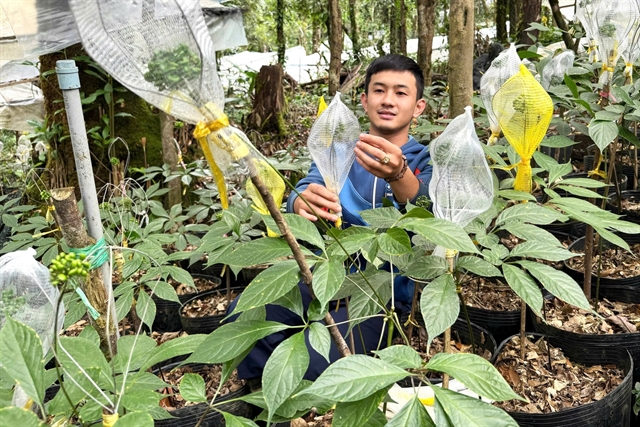 |
| A local farmer protects Ngọc Linh ginseng flowers at his farm. Ginseng is seen as a key medicinal herb for sustainable agriculture growth for Đà Nẵng. —Photo courtesy of Phan Vinh |
He said local farmers and investors are expected to benefit from the decree when starting forest canopy-based ginseng farms or ginseng-related processing projects.
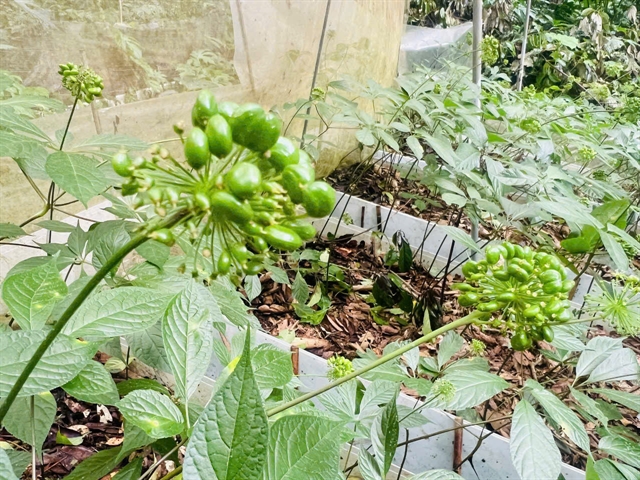 |
| Ngọc Linh ginseng flowers. The ginseng farms will be expanded to the forest in a mountainous area of Đà Nẵng City. — Photo courtesy of Phan Vinh |
“The new decree will help save time in forest land-use procedures, which will take just one or two months instead of three or four, while the local ethnic community, including 48 members of the Xơ Đăng ethnic group who are part of the Ngọc Linh ginseng association, will be prioritised for forest land allocation for ginseng farming,” he explained.
He said investors in ginseng will be given a preferential rate for renting forest land to help reduce production costs by up to 15 per cent.
“Local ginseng farmers will have a legal basis for planting in forests, with strict regulations on nature protection, reducing the illegal activities of collecting ginseng, herbs and forestry products," he said.
Legal foundation
Bửu, who is the mastermind of the former Nam Trà My District's Ngọc Linh ginseng development plan, said the clear legal framework and policy of transparency would help attract between VNĐ1 trillion (US$38 million) and VNĐ2 trillion (under $76 million) in local ginseng production, creating 1,500 jobs for rural communities as well as increasing the average annual income from VNĐ20 million ($765) to VNĐ30 million ($1,150) per household.
Ríah Cường, manager of the Trường Sơn Xanh agriculture and medicinal herb co-operative, said the decree includes specific laws to identify boundaries for forest canopy land-rent allocations.
He said that previously, local farmers were confused about harvesting in the border areas of forest ginseng farms due to a lack of legal regulations.
The decree also offers an open policy forest environmental service rate for all investors, at 5 per cent of revenue per total forest land-rent area over a 10-year term, he said.
“This policy will create stability for all investors and farmers when they put money into ginseng projects. They need enough time to recover their investment capital and earn profits from the rented land," Cường noted.
Nguyễn Đức Lực, chairman of Sâm Sâm Company and the Ngọc Linh Ginseng Association, said the decree will remove a bottleneck that had kept ginseng farming and processing industries from developing.
“Many investors hesitated to put their money into farms and factories for Ngọc Linh ginseng due to the risk. Forest-canopy ginseng and medicinal herb farming must be subject to legal regulations, and the introduction of the decree has happened just in time,” Lực said.
He said the decree will help classify standards and certified labels for the ginseng roots grown in legal forest-canopy farms, as opposed to those illegally harvested from the wild.
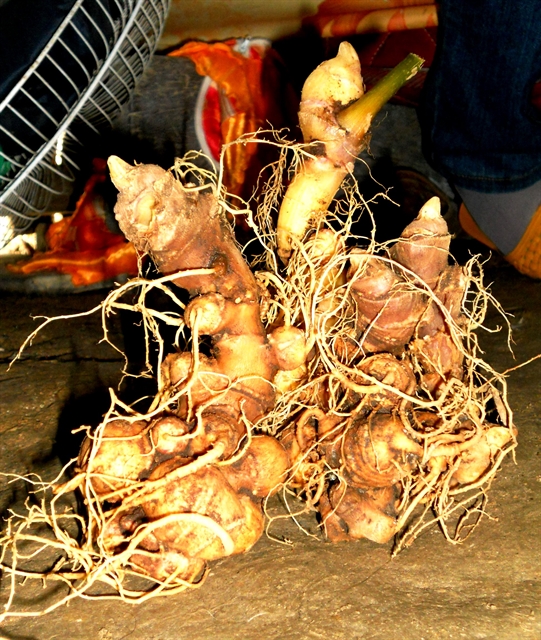 |
| A Ngọc Linh ginseng root harvested from a mountain farm in Đà Nẵng. The ginseng root can be used as a raw material for high-value products. — Photo courtesy of Nguyễn Thọ |
“The development of the herb industry will draw in huge investments from domestic investors and partners with the enforcement of the decree. The new legal foundation will help increase transparency in policymaking and create fair competition for all sectors in the development of the ginseng brand,” he stated.
Lực stressed the fact that local ginseng and medicinal herbs must meet global standards in farming and production to access markets around the world.
Bửu said 90 per cent of the Ngọc Linh ginseng products exported last year had a Geographical Indication given by the Intellectual Property Office of Việt Nam.
He noted that the development of Ngọc Linh ginseng will be challenging due to environmental controls and biodiversity protections relating to forest-canopy farms.
A VNĐ50 billion ($1.9 million) fund has been approved to build the first Ngọc Linh ginseng research centre in 2026, and the first 500ha of special-use forest land will be set aside for local farmers and investors by the end of this year.
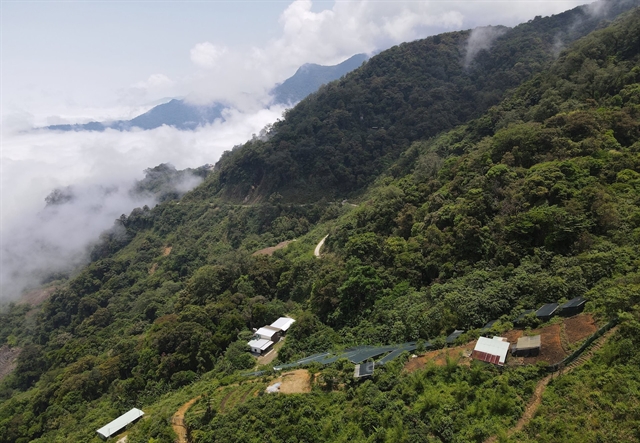 |
| Ngọc Linh ginseng farms on mountainous terrain at 1,400m above sea level. Đà Nẵng plans to become a regional centre for ginseng farming and processing. — Photo courtesy of Hồ Quân |
“Businesses and local farmers will face difficulties in raising at least VNĐ1 billion ($38,000) per hectare in the initial stage of farming the ginseng,” he said.
Forest-canopy ginseng farms have been designated as a source of high-value medicinal herbs as well as an eco-tourism experience, with 10,000 visitors expected in 2026, Bửu said.
The trade of Ngọc Linh ginseng was recognised as ‘folk knowledge’ and included in the National Intangible Cultural Heritage list.
Ngọc Linh ginseng has traditionally been farmed on more than 1,600ha of land in the region's forests at 1,400m above sea level.
The State-owned telecom firm Viettel is a strategic partner in promoting digital applications in the development of ginseng farming, and is building a ginseng nursery and sapling centre.
Thaco Group has also signed Memorandums of Understanding (MoUs) with China's Sinopharm Group and partners in Jilin, China on developing Ngọc Ling ginseng in local terrain. — VNS




